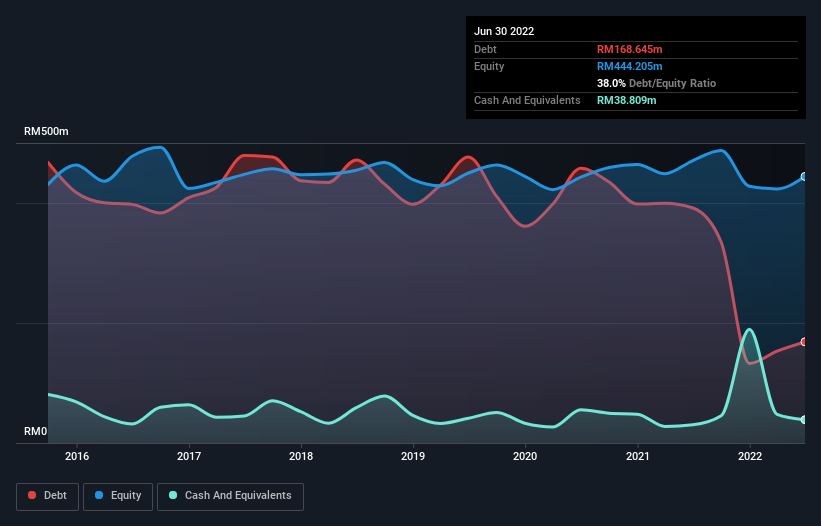- Malaysia
- /
- Commercial Services
- /
- KLSE:PBSB
Pelikan International Corporation Berhad (KLSE:PELIKAN) Has A Somewhat Strained Balance Sheet
Warren Buffett famously said, 'Volatility is far from synonymous with risk.' When we think about how risky a company is, we always like to look at its use of debt, since debt overload can lead to ruin. As with many other companies Pelikan International Corporation Berhad (KLSE:PELIKAN) makes use of debt. But is this debt a concern to shareholders?
When Is Debt A Problem?
Debt assists a business until the business has trouble paying it off, either with new capital or with free cash flow. If things get really bad, the lenders can take control of the business. However, a more frequent (but still costly) occurrence is where a company must issue shares at bargain-basement prices, permanently diluting shareholders, just to shore up its balance sheet. Of course, the upside of debt is that it often represents cheap capital, especially when it replaces dilution in a company with the ability to reinvest at high rates of return. When we examine debt levels, we first consider both cash and debt levels, together.
Check out our latest analysis for Pelikan International Corporation Berhad
What Is Pelikan International Corporation Berhad's Debt?
The image below, which you can click on for greater detail, shows that Pelikan International Corporation Berhad had debt of RM168.6m at the end of June 2022, a reduction from RM391.6m over a year. However, it does have RM38.8m in cash offsetting this, leading to net debt of about RM129.8m.

How Healthy Is Pelikan International Corporation Berhad's Balance Sheet?
We can see from the most recent balance sheet that Pelikan International Corporation Berhad had liabilities of RM455.2m falling due within a year, and liabilities of RM325.5m due beyond that. Offsetting this, it had RM38.8m in cash and RM311.2m in receivables that were due within 12 months. So it has liabilities totalling RM430.6m more than its cash and near-term receivables, combined.
This deficit casts a shadow over the RM162.9m company, like a colossus towering over mere mortals. So we'd watch its balance sheet closely, without a doubt. After all, Pelikan International Corporation Berhad would likely require a major re-capitalisation if it had to pay its creditors today.
We use two main ratios to inform us about debt levels relative to earnings. The first is net debt divided by earnings before interest, tax, depreciation, and amortization (EBITDA), while the second is how many times its earnings before interest and tax (EBIT) covers its interest expense (or its interest cover, for short). Thus we consider debt relative to earnings both with and without depreciation and amortization expenses.
Pelikan International Corporation Berhad's net debt is only 0.68 times its EBITDA. And its EBIT easily covers its interest expense, being 15.7 times the size. So we're pretty relaxed about its super-conservative use of debt. Even more impressive was the fact that Pelikan International Corporation Berhad grew its EBIT by 438% over twelve months. That boost will make it even easier to pay down debt going forward. There's no doubt that we learn most about debt from the balance sheet. But you can't view debt in total isolation; since Pelikan International Corporation Berhad will need earnings to service that debt. So if you're keen to discover more about its earnings, it might be worth checking out this graph of its long term earnings trend.
Finally, a company can only pay off debt with cold hard cash, not accounting profits. So it's worth checking how much of that EBIT is backed by free cash flow. In the last three years, Pelikan International Corporation Berhad's free cash flow amounted to 22% of its EBIT, less than we'd expect. That's not great, when it comes to paying down debt.
Our View
We feel some trepidation about Pelikan International Corporation Berhad's difficulty level of total liabilities, but we've got positives to focus on, too. To wit both its interest cover and EBIT growth rate were encouraging signs. Taking the abovementioned factors together we do think Pelikan International Corporation Berhad's debt poses some risks to the business. So while that leverage does boost returns on equity, we wouldn't really want to see it increase from here. There's no doubt that we learn most about debt from the balance sheet. However, not all investment risk resides within the balance sheet - far from it. For instance, we've identified 1 warning sign for Pelikan International Corporation Berhad that you should be aware of.
At the end of the day, it's often better to focus on companies that are free from net debt. You can access our special list of such companies (all with a track record of profit growth). It's free.
New: Manage All Your Stock Portfolios in One Place
We've created the ultimate portfolio companion for stock investors, and it's free.
• Connect an unlimited number of Portfolios and see your total in one currency
• Be alerted to new Warning Signs or Risks via email or mobile
• Track the Fair Value of your stocks
Have feedback on this article? Concerned about the content? Get in touch with us directly. Alternatively, email editorial-team (at) simplywallst.com.
This article by Simply Wall St is general in nature. We provide commentary based on historical data and analyst forecasts only using an unbiased methodology and our articles are not intended to be financial advice. It does not constitute a recommendation to buy or sell any stock, and does not take account of your objectives, or your financial situation. We aim to bring you long-term focused analysis driven by fundamental data. Note that our analysis may not factor in the latest price-sensitive company announcements or qualitative material. Simply Wall St has no position in any stocks mentioned.
About KLSE:PBSB
PBS Berhad
Manufactures and distributes fine writing and stationeries in Malaysia, Singapore, China/Taiwan, Thailand, Greece, and internationally.
Flawless balance sheet with proven track record.
Market Insights
Community Narratives




